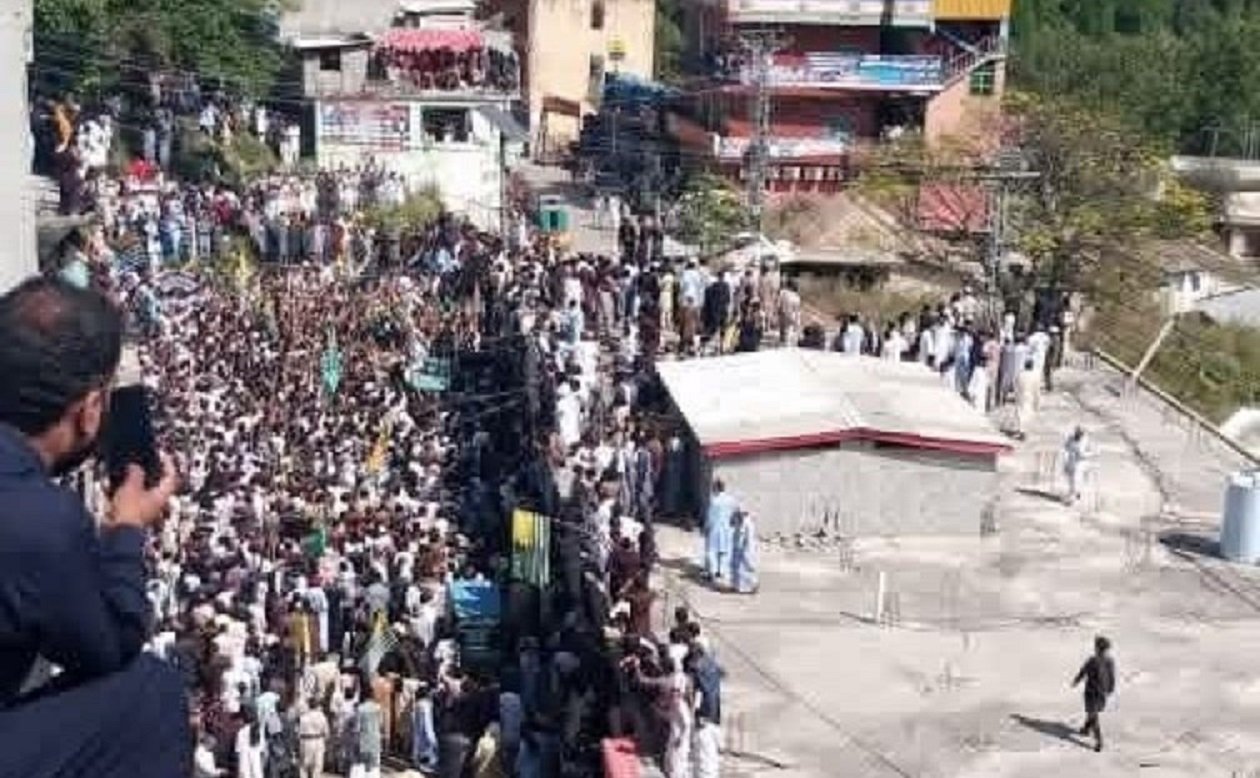The JKJAAC Activates Plan B which means Mass Mobilization towards Muzaffarabad after Blocking Entry Points.
In a significant move, JAC Announces Plan B for AJK Protests. It is a noteworthy escalation of its ongoing protest movement, The Jammu & Kashmir Joint Awami Action Committee (JKJAAC) has activated Plan B, calling for a massive, long march to Muzaffarabad on 1 October 2025. A strategic long march towards Muzaffarabad after blocking all entry points to Azad Jammu & Kashmir (AJK) starting at midnight on 30 September 2025. The plan comes amid heightened tensions following the Neelum Bridge incident, in which one protester, Sudheer, lost his life and 18 others were injured.
Interestingly, the government had accepted the demands of Joint Action Committee last year. The prices of electricity and flour rates were significantly reduced after protests. However, the current demands are much bigger and the coordination is also much better.
Coordinated Civil Movement
Under Plan B, JKJAAC has organized protesters from all districts of AJK, ensuring representation from Mirpur, Bhimber, Neelum, Poonch, Palandri and other regions. With the entry points blocked, protesters are set to converge on Muzaffarabad via multiple, carefully coordinated routes, highlighting the widespread public support for the movement. Leaders emphasized that the march will remain peaceful and disciplined, with demonstrators following strict non-violence guidelines while maintaining visibility of their demands.
Thousands of participants are expected to join the Plan B march, making it the largest coordinated civil movement in AJK’s recent history. The committee has coordinated logistics along multiple routes to ensure safe passage while maintaining a continuous, disciplined demonstration of public support. Protesters from all walks of life traders, students, transport workers, lawyers, and civic activists are participating, signaling a unified front across the territory. It is interesting as Pakistan highlights India’s Role in Regional Instability usually. However, there is a strong local presence in the current protests.
What the Charter Seeks?
The 38-point charter covers a wide field, but the demands cluster into four main themes: economic relief and resource rights, reduction of elite privileges and governance reform, local empowerment and public services, and constitutional/political changes. These include:
1) Economic relief and resource claims
- Wheat/flour subsidy: The committee demanded subsidized wheat or flour rates comparable to those offered to other regions such as Gilgit-Baltistan. This was an immediate, high-visibility demand because rising food prices are politically explosive.
- Electricity tariff at production cost: A core demand asks that electricity charges be tied to the cost of production especially where hydropower projects such as Mangla operate in AJK. Protesters argue AJK should receive royalty or cheaper local rates because the power is generated there.
2) Rollback of elite privileges and accountability
- Abolition of perks: The charter demands elimination of special privileges and perks enjoyed by ministers, senior bureaucrats and lawmakers in AJK. Protesters framed this as necessary to redirect public funds into services.
- Active accountability institutions: JKJAAC wants a robust anti-corruption mechanism and amendments to local accountability laws so officials can be held responsible.
3) Local empowerment, services and infrastructure
- Municipal empowerment: The committee has asked that municipal representatives receive real powers and funding instead of top-down control. They want local governance to be meaningful, not symbolic.
- Public services: Free or subsidized healthcare and education features prominently in the broader charter. Additionally, improved telecom and internet service in remote areas is a repeated demand.
4) Political/constitutional demands
- Abolition of reserved refugee seats: One of the most controversial and politically explosive demands calls for ending the 12 assembly seats reserved for Kashmiri migrants from Indian-administered Jammu & Kashmir. JKJAAC argues these seats distort local representation; opponents warn the move would disenfranchise a refugee population and create constitutional complications. Interestingly, Mushaal Mullick has called for empowerment of refugees recently.
- Revision of local laws and privileges: Beyond reserved seats, the charter asks for broader legislative reforms to reduce centralized privileges and increase local rights over natural resources.
Authorities have deployed additional security personnel along major highways and access points. However, JKJAAC leaders insist the march will remain entirely peaceful, warning that any attempt to disrupt demonstrators could escalate tensions further. The committee has emphasized that their protest is non-violent, and their focus remains on achieving justice and reforms rather than confrontation.
With entry points blocked and protesters converging from all districts of AJK, Plan B demonstrates JKJAAC’s organizational strength and public support. The long march towards Muzaffarabad is not only a response to the recent Neelum Bridge incident but also a broader demand for accountability, transparency, and systemic reforms. By uniting citizens across the region in a disciplined, peaceful manner, the committee seeks to compel authorities to address their long-standing grievances while drawing national and international attention to the situation in Azad Jammu & Kashmir.





